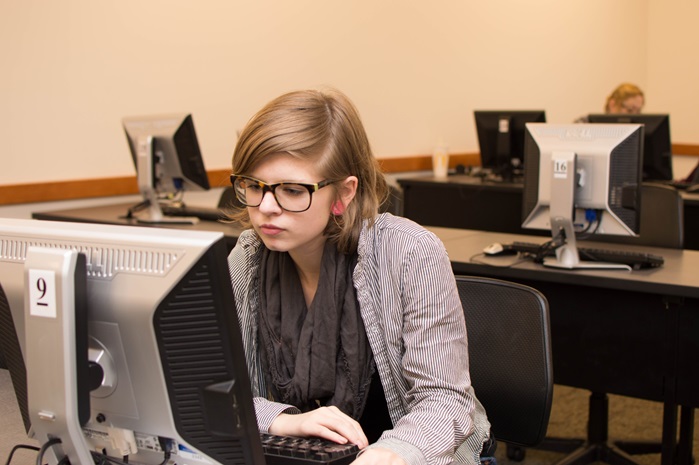Overview

The statewide Computer Science Major Transfer Map (MTM) will use the format of an Associate of Science Transfer degree.
The MTMs identify the optimal and specific set of community college courses students need to take to transfer efficiently into the major at the university. The successful completion of the MTM allows students to receive status at the public university, based on the number of academic credits referenced in the transfer agreement, including at least 30 credits of general education satisfied, that is comparable to the status of students with the same number of academic credits in the major course of study who began their postsecondary studies at the public university. The students will not be required to retake a course, as long as the minimum required grades have been earned.
Students must have earned a cumulative grade point average of 2.0 and meet the residency requirements at the community college awarding the MTM.
The Computer Science Major Transfer Map (MTM) outlines Oregon community college coursework to complete in order to transfer seamlessly to any Oregon four-year public university to earn a bachelor of science (B.S.) in computer science. The Computer Science MTM is intended for students who know they want to transfer and earn a B.S. in computer science, but who are unsure of their intended transfer destination when they begin their community college studies. Students should work with their community college advisor to ensure they properly fulfill the requirements of this Computer Science MTM.
Click to view Major Transfer Map (MTM) agreement.
Program Learning Outcomes
Program Outcomes
Student who successfully complete this program will be able to:
- Develop software using both structured and object-oriented paradigms that meets the requirements of a written specification.
- Explain the software development lifecycle and the specific tools and processes used to create software.
- Design, analyze, and implement algorithms to solve computational problems using various data structures as problem-solving tools. These data structures must include arrays, stacks, queues, linked lists, trees, and hash tables.
Meets General Education Requirements
In addition to Institutional Learning Outcomes, standards have been established for Student Learning Outcomes in General Education Courses in the following categories: Arts and Letters, Cultural Literacy, Mathematics, Science or Computer Science, Social Science, Speech and Oral Communication, Writing, and Information Literacy. Coursework in each of these areas supports student achievement of these outcomes. TBCC evaluates student achievement of course learning outcomes on a regular basis, and this information is used for continuous improvement in instruction and student services.
Arts & Letters
Outcomes
As a result of taking General Education Arts & Letters* courses, a student should be able to:
-
Interpret and engage in the Arts & Letters, making use of the creative process to enrich the quality of life; and
-
Critically analyze values and ethics within a range of human experience and expression to engage more fully in local and global issues.
-
*“Arts & Letters” refers to works of art, whether written, crafted, designed, or performed and documents of historical or cultural significance.
Cultural Literacy
Cultural Literacy outcomes will be included in courses that meet the outcomes and criteria of an AAOT Discipline Studies requirement.
Outcomes
As a result of taking a designated Cultural Literacy course, a student should be able to:
Mathematics
Outcomes
As a result of taking General Education Mathematics courses, a student should be able to:
-
Use appropriate mathematics to solve problems: Recognize which mathematical concepts are applicable to a scenario, apply appropriate mathematics and technology in its analysis, and then accurately interpret, validate, and communicate the results.
-
Use logical reasoning to make connections between various mathematical concepts and representations.
Science or Computer Science
Outcomes
As a result of taking General Education Science or Computer Science courses, a student should be able to:
-
Gather, comprehend, and communicate scientific and technical information in order to explore ideas, models, and solutions and generate further questions;
-
Apply scientific and technical modes of inquiry, individually, and collaboratively, to critically evaluate existing or alternative explanations, solve problems, and make evidence-based decisions in an ethical manner; and
-
Assess the strengths and weaknesses of scientific studies and critically examine the influence of scientific and technical knowledge on human society and the environment.
Social Science
Outcomes
As a result of taking General Education Social Science courses, a student should be able to:
-
Apply analytical skills to social phenomena in order to understand human behavior; and
-
Apply knowledge and experience to foster personal growth and better appreciate the diverse social world in which we live.
Speech/Oral Communication
Outcomes
As a result of taking General Education Speech/Oral Communication courses, a student should be able to:
-
Engage in ethical communication processes that accomplish goals;
-
Respond to the needs of diverse audiences and contexts; and
-
Build and manage relationships.
Writing
Outcomes
As a result of completing the General Education Writing sequence, a student should be able to:
-
Read actively, think critically, and write purposefully and capable for academic and, in some cases, professional audiences;
-
Locate, evaluate, and ethically utilize information to communicate effectively; and
-
Demonstrate appropriate reasoning in response to complex issues.
Information Literacy
Information Literacy outcomes and criteria will be embedded in the Writing Foundational Requirements courses.
Outcomes
As a result of taking General Education Writing courses infused with Information Literacy, a student who successfully completes should be able to:
-
Formulate a problem statement;
-
Determine the nature and extent of the information needed to address the problem;
-
Access relevant information effectively and efficiently;
-
Evaluate information and its source critically; and
-
Understand many of the economic, legal, and social issues surrounding the use of information